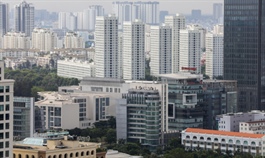Smart cities the biggest game for startups in Vietnam
Smart cities the biggest game for startups in Vietnam
A smarter lifestyle that caters to the citizens of the 21st century and helps protect the planet and stands high on Vietnam’s agenda in urban development, opening many chances for local and foreign-funded startups in the country.
Many fresh startups have been developing tech solutions in logistics and supply chain management and transport improvement, offering convenient solutions to serve customers and contributing to establishing smart cities in Vietnam.
Founded three years ago, VIoT JSC is a tech startup focusing on solving the problems of smart city development.
The company is producing a range of products, such as smart buttons with Bluetooth and connectivity systems for outdoor and indoor advertising signs, serving urban authorities in managing digital content remotely, such as in an industrial zone, a port, and even a whole city.
Nguyen Bach Viet, founder and chairman of VIoT, said that using smart technology, his group embarked on researching sensor devices for street lights on an open platform for centralised management to reduce greenhouse gas emissions and solve energy problems.
“With this technology we are contributing to the digital transformation of infrastructure, developing applications for smart cities, agriculture, and factories,” Viet said.
Vietnam’s urban areas are developing extremely quickly. Figures from the Ministry of Construction show that the country’s urbanisation rate now is at 37.5 per cent, and it has more than 813 cities and urban areas nationwide.
This is considered a good sign for economic development, creating conditions for more innovation and investment, but also poses challenges such as environmental pollution and traffic congestion.
By applying technology, cities are expected to increase management efficiency, reduce costs, be more transparent, and bring more value to each citizen. The development of a smart city, where many problems of a modern city are solved through the application of technologies, is also deemed to create a more convenient and humane living environment.
According to Pham Hong Quat, director general of Vietnam’s National Agency for Technology Entrepreneurship and Commercialisation Development, the spirit of entrepreneurship has not diminished despite the pandemic.
In 2021, many new technology units within smart urban and real estate technology have joined the endeavour to create solutions for real estate management in Vietnam.
“However, this game is not easy. Vietnam needs to be aware of the trends, and startups need to take advantage to create breakthroughs,” Quat said.
According to a research report on real estate in the Vietnamese economy and its role and policy recommendations, released by the Vietnam National Real Estate Association in 2021, startups have a wide range in doing business in this field, with 40 industries and sectors that are closely related to the real estate market, from manufacturing, finance and banking, and construction to tourism and many others.
Meanwhile, Phan Van Hung, head of Smart City and Proptech Villages, said that Vietnam is a fast developing market with a young population where advanced technologies have much room for growth, especially for smart city development.
“Smart cities, however, remain a new field in Vietnam. Therefore, startups must know how to access this field and should learn from other countries and to apply their expertise to the Vietnamese market,” Hung said.
Meanwhile, Assoc. Prof. Dr. Hoang Manh Nguyen, director at the Vietnam Green Urban Research and Development Institute, emphasised that green transport, vehicles, and the environment also must be the most concerned topics in smart city development.
“Advanced technologies will help us to use and recycle energy. At present, our cities and urban areas are focusing on technological solutions for waste treatment, water supply, and traffic improvement,” Nguyen said.
“There are still challenges ahead in applying solutions for development, and startups must improve themselves to meet these,” he added. “I believe that our startups will become familiar and able to create a sustainable ecosystem for developing smart cities in Vietnam.”
The Vietnamese government has issued many supportive policies and opened corridors to create an ecosystem for creative startups. The government’s promotion of smart city development and national digital transformation could be an excellent opportunity for tech startups.
Currently, Vietnam has more than 1,000 organisations capable of supporting startups, including 202 coworking zones, 79 business incubators, and 38 business promotion organisations.
The number of venture capital funds that consider Vietnam a target market or have operations in Vietnam stands currently at 210. Of which, 37 funds have Vietnamese legal entities. Their number has continuously increased over the years.























